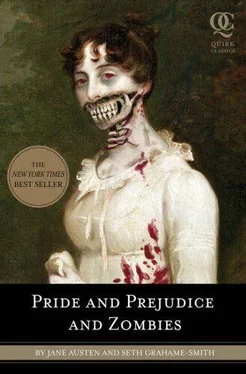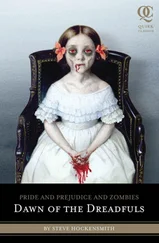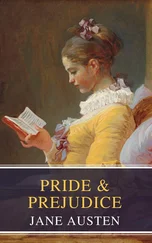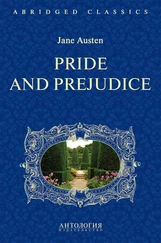“I hope,” added Mrs. Gardiner, “that no consideration with regard to this young man will influence her. We go out so little, that it is very improbable that they should meet at all, unless he comes to see her.”
“And that is quite impossible; for he is now in the custody of his friend, and Mr. Darcy would no more suffer him to call on Jane in Section Six East!”
“So much the better. I hope they will not meet at all.”
The Gardiners stayed a week at Longbourn. Mrs. Bennet had so carefully provided for the entertainment of her brother and sister that they did not once sit down to a family dinner. When the engagement was for home, some of the officers always made part of it-of which Mr. Wickham was sure to be one; and on these occasions, Mrs. Gardiner, rendered suspicious by Elizabeth’s warm commendation, narrowly observed them both. Their preference of each other was plain enough to make her a little uneasy; and she resolved to speak to Elizabeth on the subject before leaving Hertfordshire.
To Mrs. Gardiner, Wickham had one means of affording pleasure, unconnected with his general powers. About ten or a dozen years ago, before her marriage, she had spent a considerable time in that very part of Derbyshire to which he belonged. They had, therefore, many acquaintances in common; and though Wickham had been little there since the death of Darcy’s father, it was yet in his power to give her fresher intelligence of her former friends than she had been in the way of procuring.
Mrs. Gardiner had seen Mr. Darcy’s estate, Pemberley, and known the late Mr. Darcy by his reputation as a gentleman and powerful slayer of the undead. Here consequently was an inexhaustible subject of discourse. On being made acquainted with the present Mr. Darcy’s treatment of him, she tried to remember some of that gentleman’s reputed disposition, and was confident that she recollected having heard Mr. Fitzwilliam Darcy formerly spoken of as a very proud, ill-natured boy.
MRS. GARDINER’S CAUTION to Elizabeth was punctually and kindly given on the first favourable opportunity of speaking to her alone; after honestly telling her what she thought, she thus went on:
“You are too sensible a girl, Lizzy, to fall in love merely because you are warned against it; and, therefore, I am not afraid of speaking openly. Seriously, I would have you be on your guard. I have nothing to say against him ; he has felled many a zombie; and if he had the fortune he ought to have, I should think you could not do better. But as it is, you must not let your fancy run away with you.”
“My dear aunt, this is being serious indeed.”
“Yes, and I hope to engage you to be serious likewise.”
“Well, then, you need not be under any alarm. I will take care of myself, and of Mr. Wickham too. He shall not be in love with me, if I can prevent it.”
“Elizabeth, you are not serious now.”
“I beg your pardon, I will try again. I am a warrior, madam: survivor of the thirty-six chambers of Shaolin, beholder of the scrolls of Gan Xian Tan. I do not seek love, and at present I am not in love with Mr. Wickham; though he is, beyond all comparison, the most agreeable man I ever saw-in form, character, and musketry. However, I see the imprudence of an attachment with one so deeply in want of fortune. I will not be in a hurry to believe myself his first object. When I am in company with him, I will not be wishing. In short, I will do my best.”
“Perhaps it will be as well if you discourage his coming here so very often. At least, you should not remind your mother of inviting him.”
“You know my mother’s ideas as to the necessity of constant company for her friends. But really, and upon my honour, I will try to do what I think to be the wisest; and now I hope you are satisfied.”
Her aunt assured her that she was, and Elizabeth having thanked her for the kindness of her hints, they parted; a wonderful instance of advice being given on such a point, without being resented.
Mr. Collins returned into Hertfordshire soon after it had been quitted by the Gardiners and Jane; but as he took up his abode with the Lucases, his arrival was no great inconvenience to Mrs. Bennet. His marriage was now fast approaching, and she was at length so far resigned as to think it inevitable, and even repeatedly to say, in an ill-natured tone, that she “wished they might be happy. “Thursday was to be the wedding day, and on Wednesday Miss Lucas paid her farewell visit; and when she rose to take leave, Elizabeth, ashamed of her mother’s ungracious and reluctant good wishes, and sincerely affected herself, accompanied her out of the room. As they went downstairs together, Charlotte said:
“I promise to write for as long as I am able. I shall depend on hearing from you very often, Eliza.”
“ That you certainly shall.”
“We shall often meet, I hope, in Hertfordshire.”
“I am not likely to leave Kent for some time. Promise me, therefore, to come to Hunsford.” Elizabeth could not refuse, though she foresaw little pleasure in the visit. Charlotte was already showing the earliest signs of transformation, though she took great care to hide them from all but the trained eye. Her skin had taken on a slight pallor, and her speech seemed a trifle laboured.
“My father and Maria are coming to me in March,” added Charlotte, “and I hope you will consent to be of the party. Indeed, Eliza, you will be as welcome as either of them.”
The wedding took place, and no one other than Elizabeth seemed to suspect the bride’s condition. Mr. Collins appeared happier than he ever had despite the fact that Charlotte had to be reminded to use her fork several times over the course of dinner. The bride and
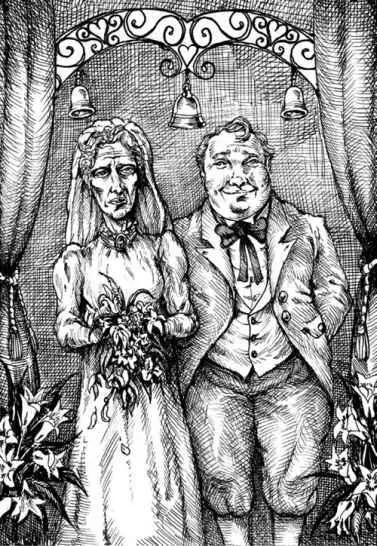
“THE WEDDING TOOK PLACE, AND NO ONE OTHER THAN ELIZABETH SEEMED TO SUSPECT THE BRIDE’S CONDITION.”
bridegroom set off for Kent from the church door, and everybody had as much to say, or to hear, on the subject as usual. Elizabeth soon heard from her friend; and their correspondence was as regular and frequent as it had ever been; that it should be equally affectionate was impossible. Charlotte’s first letters were received with a good deal of eagerness; there could not but be curiosity to know how she would speak of her new home, how she would like Lady Catherine, and how her transformation was proceeding. The house, furniture, neighbourhood, and roads, were all to her taste, and Lady Catherine’s behaviour was most friendly and obliging. It was Mr. Collins’s picture of Hunsford and Rosings rationally softened; and Elizabeth perceived that she must wait for her own visit there to know the rest. The only harbinger of Charlotte’s unhappy fate was her ever-worsening penmanship.
Jane had already written a few lines to her sister to announce their safe arrival in London; and when she wrote again, Elizabeth hoped it would be in her power to say something of the Bingleys.
Her impatience for this second letter was as well rewarded as impatience generally is. Jane had been a week in town without either seeing or hearing from Caroline. She accounted for it, however, by supposing that her last letter to her friend from Longbourn had by some accident been lost.
“My aunt,” she continued, “is going to-morrow into that part of the town, and I shall take the opportunity of calling in Section Four Central.”
She wrote again when the visit was paid, and she had seen Miss Bingley. “I did not think Caroline in spirits,” were her words, “but she was very glad to see me, and reproached me for giving her no notice of my coming to London. I was right, therefore, my last letter had never reached her. I inquired after their brother, of course. He was well, but so much engaged with Mr. Darcy that they scarcely ever saw him. I found that Miss Darcy was expected to dinner. I wish I could see her. My visit was not long, as Caroline and Mrs. Hurst were going out. I dare say I shall see them soon here.”
Читать дальше
